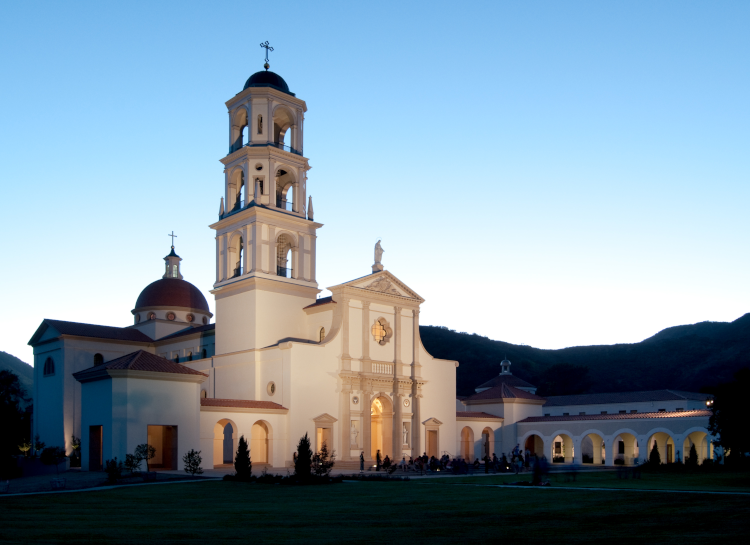- Home
-
About
 Fidelity & Excellence
Fidelity & ExcellenceThomas Aquinas College is unique among American colleges and universities, offering a faithfully Catholic education comprised entirely of the Great Books and classroom discussions.
-
A Liberating Education
 Truth Matters
Truth MattersTruth, and nothing less, sets men free; and because truth is both natural and supernatural, the College’s curriculum aims at both natural and divine wisdom.
-
A Catholic Life
 Under the Light of Faith
Under the Light of FaithThe intellectual tradition and moral teachings of the Catholic Church infuse the whole life of Thomas Aquinas College, illuminating the curriculum and the community alike.
-
Admission & Aid
 Is TAC Right for You?
Is TAC Right for You?Do you enjoy grappling with complex questions? Are you willing to engage in discussions about difficult concepts, with the truth as your ultimate goal?
-
Students & Parents
 Mind, Body & Spirit
Mind, Body & SpiritThere is always something to do at TAC — something worthwhile, something fulfilling, and something geared toward ever-greater spiritual and intellectual growth.
-
Alumni & Careers
 What Can You Do with a Liberal Education?
What Can You Do with a Liberal Education?Nothing speaks more to the versatility of the College’s academic program than the good that our alumni are doing throughout the Church and the world.
- Search
- Giving
College Wins Permanent Protection from HHS Contraceptive Mandate!

Marking the culmination of a four-year legal effort that went all the way to the United States Supreme Court, the U.S. government on Friday agreed to a settlement that will permanently exempt Thomas Aquinas College from the so-called HHS Contraceptive Mandate of the Affordable Care Act.
“This is an extraordinary outcome for Thomas Aquinas College and for the cause of religious freedom,” says Thomas Aquinas College President Michael F. McLean “It is a relief to know that the College can continue its 46-year mission of offering excellent Catholic liberal education without facing the threat of crippling financial penalties resulting from our commitment to the full teachings of the Catholic Church.”
Instituted in 2012, the HHS Mandate sought to compel all employers — even Catholic ones — to provide free contraceptive, abortifacient, and sterilization coverage to their employees. In 2013 the College and several co-plaintiffs, citing the First Amendment and the Religious Freedom Restoration Act of 1993, challenged the mandate in federal court. The litigation eventually made its way to the U.S. Supreme Court, which in 2015 agreed to consider the lawsuit, as well as six others, in the consolidated case of Zubik v. Burwell. One year later, the Court took the unusual step of vacating the lower court opinions and remanding the consolidated cases back to their respective courts of appeal for further consideration.
Negotiations between the involved parties began in earnest earlier this year, following the change in presidential administrations, and led ultimately to Friday’s settlement, signed by plaintiffs as well as representatives of the Departments of Treasury, Labor, and Health and Human Services. The agreement comes eight days after these same departments broadened the religious-liberty exemptions of the original HHS Mandate, dispensing religious employers from the requirement to provide objectionable coverage in their health plans.
“The broadened exemption was a welcome development,” says Quincy Masteller, Thomas Aquinas College’s general counsel. “This settlement, however, affords even greater protection to our religious freedom because it will be binding on all future administrations.”
Under the terms of the settlement, the government concedes that the HHS Mandate “imposes a substantial burden” on plaintiffs’ “exercise of religion” and, as such, “cannot be legally enforced, under RFRA, against Plaintiffs or their health plans.” The government therefore agrees to treat plaintiffs “as exempt from the Regulations or any materially similar regulation or agency policy.”
This favorable outcome, says Chairman of the Board of Governors R. Scott Turicchi, vindicates the College’s decision to challenge the Mandate in court. “Thomas Aquinas College would not compromise its Catholic identity and instead took a stand for religious liberty,” he says. “This settlement agreement assures that the College can continue its mission of Catholic liberal education, providing its students the intellectual, spiritual, and moral formation they need to take up positions of leadership in the Church and in society, in service to the truth.”
As part of the settlement, the government promises to pay a portion of the legal costs and fees incurred by Jones Day, the Washington D.C.-based law firm that represented the College, its co-plaintiffs, and many other plaintiffs around the country, pro bono. “We cannot begin to express the depths of our gratitude to Jones Day, both for its generosity and for the excellence of its legal representation,” says President McLean.
“We are also profoundly grateful to our co-plaintiffs, who fought steadfastly beside us, and to the many friends of the College — Board members, benefactors, alumni, parents, students, faculty, and staff — who never wavered in their support or encouraged us to compromise our faith, and who prayed fervently for an outcome such as this. We are grateful to live in a country that has a rich tradition of protecting the free exercise of religion for all of its citizens. And, above all, we are grateful to God, on Whose providence we depend completely, both in good times and in bad.”

